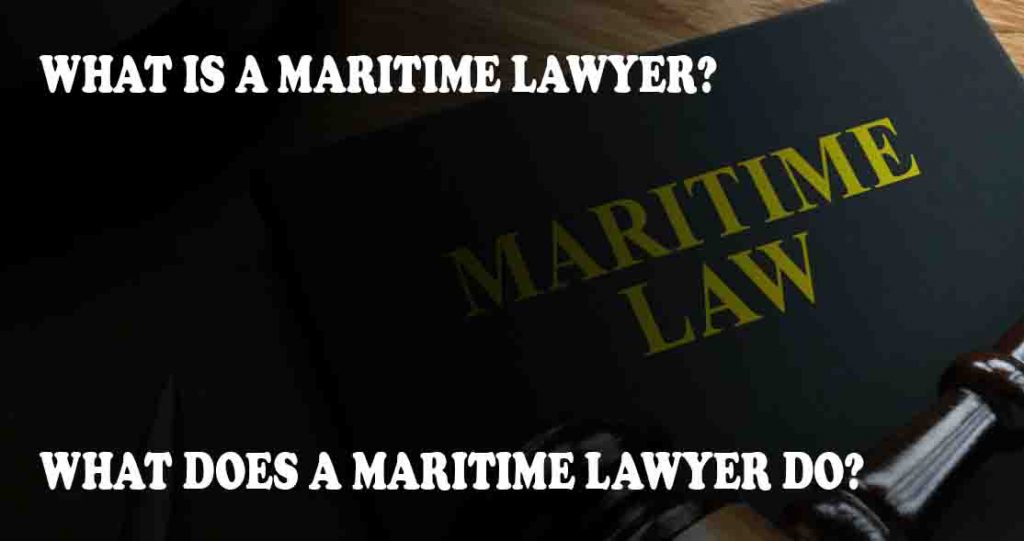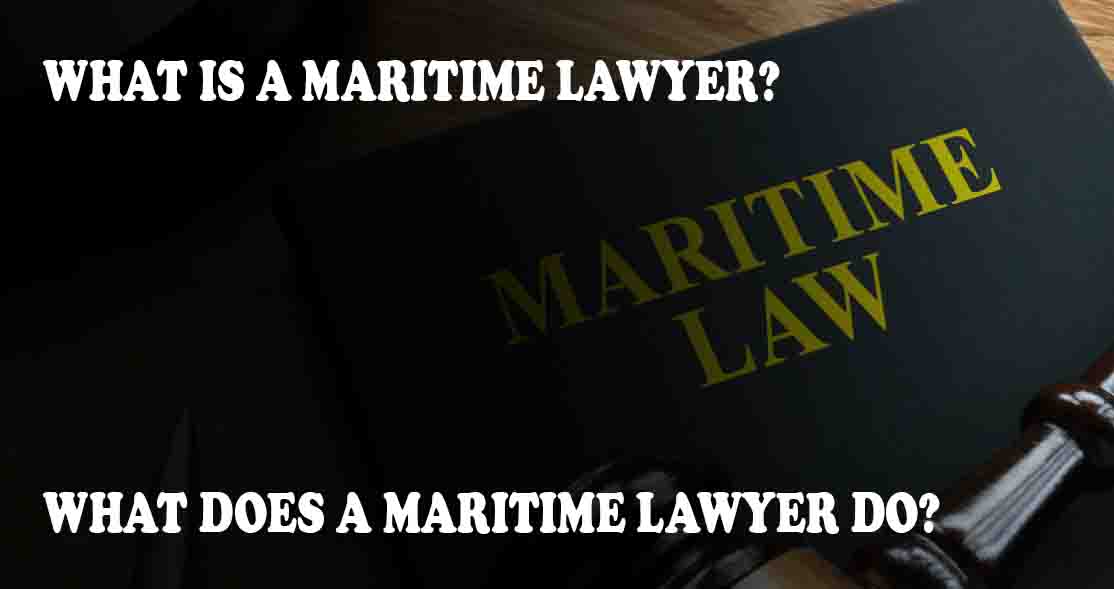Legal matters related to maritime law, such as admiralty law and international maritime law, are the specialty of a maritime lawyer. Further, maritime lawyers are capable of practicing law in a variety of different areas, including representing the interests of maritime workers and seamen injured at work or who are injured while on vacation, as well as providing assistance to maritime workers and seamen injured at sea.
An attorney who is experienced in maritime law may be able to assist with contract negotiations between a vessel owner and a third party operator. There are also lawyers who specialize in representing the interests of major corporations in the maritime industry such as oil and gas companies, commercial fishing vessels, harbour workers, cargo shipping companies, cruise lines, and other corporations that operate in the maritime industry.
According to their specific area of practice, maritime lawyers may be able to assist you with a variety of legal services and legal issues. The majority of people who have been injured in a maritime accident will require the services of a maritime attorney after they have been injured.
Table of Contents
WHAT IS MARITIME LAW?
In addition to being one of the oldest branches of law, maritime law, also known as admiralty law, predates the constitution by a very long way. Law relating to commerce and navigation in the high seas and other navigable waters is defined as a branch of law that is administered by the admiralty courts, relates to maritime commerce and navigation and relates to the high seas and other navigable waters. It is generally believed that maritime law encompasses both local laws as well as United States law, as well as international law. In addition to these laws, there are laws that govern the torts, injuries and contracts that may occur near, on, or within a body of navigable water, including any offense that might occur near, on, or within a body of navigable water.

How can a maritime lawyer advocate for you and your interests?
A maritime worker who sustains an injury on the job is entitled to specific protections and benefits under maritime law. These include the Jones Act as well as maintenance and cure payments, if the worker sustains an injury while on the job. In spite of this, understanding these rights can prove to be a challenging task.
The employer may attempt to escape from their responsibilities or make the employee admit that the accident was their fault, in the hope of making the employee believe that they have no basis to seek compensation from them. In the aftermath of an accident in which you have been injured, you will have the opportunity to speak with a maritime lawyer who will help you understand what your rights are and what compensation you may be entitled to.
You will also be provided with assistance when you retain a maritime law firm to represent you in filing your injury claim when you retain a maritime law firm to represent you. The lawyer you choose to represent you will negotiate with the insurance company to ensure that you receive the compensation you are entitled to. As well as arbitration or trial if necessary, they are also willing to take your case to court if necessary.
Moreover, you may be entitled to file a claim for injuries that you have sustained because of your position in the maritime industry, the location of your work, and a number of other factors and may not even realize it until you receive your settlement. It is possible for you to find out if you have grounds to seek compensation by consulting with a maritime lawyer after consulting with a maritime lawyer.
Why should you hire a maritime lawyer?
You can expect your lawyer to have a thorough understanding of all aspects of maritime law, including the Jones Act, maintenance and cure payments, the Longshore and Harbor Workers Compensation Act, and other international and open water laws. Your attorney can assist you in navigating the injury claim process based on this knowledge.
Moreover, your attorney is often able to negotiate a much larger settlement for you than you would be able to obtain on your own. You will still walk away with more compensation than you would if you were to try to negotiate a settlement on your own, even after your lawyer takes their fee out of your settlement.
WHAT DOES A MARITIME LAWYER DO?
In terms of common maritime lawyer questions, one of the most frequently asked is, “What is a maritime lawyer and what do they do? ”
Maritime Lawyers are trained attorneys who specialize in the legal representation of maritime injuries that occur in the course of both recreational and commercial boating activities. Not only do maritime lawyers protect the interests of their clients who are injured at work, but they also protect the interests of those who are injured during a recreational boating accident.
In addition to trying cases in court, maritime attorneys may also draft documents, negotiate agreements and handle complaints about injuries and illnesses caused by a variety of marine vessels or sea craft, as well as by companies that dump hazardous waste into the sea. These kinds of activities are what maritime attorneys are capable of doing.
WHAT DO MARITIME LAWYERS NEED TO KNOW?
There are often a lot of complicated aspects of maritime law, which is why maritime lawyers must have a strong understanding of international, federal and state laws. To name just a few, a maritime lawyer is also expected to have an in-depth understanding of the specifics associated with marine insurance, marine pollution, and employee compensation (Jones Act), among others. A maritime lawyer needs to be familiar with the laws relating to foreign corruption, as well as the anti-bribery provisions outlined by the Department of Justice for the United States of America.
MARITIME INJURY COMPENSATION CLAIMS
In general, maritime injury claims are very similar to workers’ compensation claims. The only difference between them is that maritime injury settlements tend to be much larger in comparison to workers’ compensation settlements. As a result of this, it is worth mentioning that working on a ship entails a much higher level of risk than working on a lot of other kinds of machinery. There is a higher settlement as a result of this fact, which compensates for this. As a maritime worker (and one who qualifies under the Jones Act as a seamen), if you suffer a maritime injury at work, you are eligible for compensation for loss of income (both present and future income), healthcare costs, loss of your faculties (both physical and mental), any rehabilitation or treatment fees, pain, emotional distress, and any other expenses related to the injury.
JONES ACT COVERAGE – WHO IS COVERED BY IT?
A seaman who is injured on the job is covered by the Jones Act. A worker must spend a minimum of 30% of the time on board a navigating vessel in order to qualify as a seaman. Essentially, this means that if a worker spends 70% of his time on land and 30% of his time working on a vessel as part of his employment, he is still covered by the Jones Act regardless of whether he works on land or on a vessel.
THE MOST COMMON CAUSES OF MARITIME INJURIES
There are several types of maritime injuries that are more common than others, even though maritime law covers a wide range of categories. As a general rule, slip and fall accidents are the most common type of accident that occurs on marine vessels. It is estimated that just over 40% of all maritime injuries are caused by these types of injuries, according to OSHA. Any type of sea vessel is going to have many wet surfaces on it, so it is not surprising that slips and falls are going to occur. However, employers should make sure that all employees are trained on how they can prevent slips and falls from occurring. Work in confined spaces, lifting heavy objects, performing repetitive movements while performing work, and working near machines that may cause harm are other types of injuries that may occur as the result of exposure to hazardous chemicals and toxic respiratory agents.
How do I choose a maritime lawyer?
The scale of justice is weighed against a background of a lawyer. It is important that you look for the following characteristics when hiring a maritime lawyer:
- Years of Maritime Law Experience
- Maritime Workers They Represent
- Representation of maritime workers
- Results of Cases
- Represets only injured parties
- Contingency fee billing
According to the Merchant Marine Act of 1920, the Jones Act governs the transport of goods within the United States, and it was established by the Merchant Marine Act of 1920. A person who suffers an injury while working at sea is most likely to be affected by the Jones Act. It is the basic premise of the law that the employer is responsible for any worker who is injured at sea while working for the company. Under the Jones Act, a worker who has been injured as a result of a job accident is entitled, not only to compensation for his or her pain and suffering, but also to compensation for all income he or she has lost due to the injury.
As soon as an injury occurs, the first thing that needs to be done is to seek medical treatment, including treatment for maritime injuries. Even if you do not intend to file a lawsuit, even if you are not planning on filing one, you want this to be on the record in case of a lawsuit, no matter how much pain and suffering you are facing. If you decided to sue at a later date due to your injury, then you give yourself the option of going to court at that time as you never know what the long-term implications of your injury may be. It is also important to remember that you may not be aware of the full extent of your injuries – this is why it is best to consult a medical professional before making a final judgment.
It is extremely important that you take pictures of the vessel and the area where you were injured as soon as possible following your accident, if you are able to do so. Make sure that you have a workmate who is capable of taking photos for you if you are not able to take them yourself. As long as you have covered all your bases before you file a lawsuit, you should do so even if you do not plan to file a lawsuit for your maritime injury. If the injury was caused by something other than what caused it, take photographs of the surroundings, as well as if any equipment or machinery was being used prior to the injury, and any machinery that was being used.
If you or a loved one has been injured or have died in a maritime accident, the maritime lawyers at Morrow & Sheppard LLP can provide you and your family with the assistance you need to recover damages. If you have been injured in an accident, you need a lawyer who understands the process of handling your case, the statute of limitations for filing a lawsuit, and also how to get you compensation in a timely manner.
A maritime attorney is well versed in both state and federal maritime laws, as well as international maritime laws. A marine insurance broker should also have a good understanding of the specifics of worker compensation (the Jones Act) and marine pollution. Upon consulting them, they will investigate the circumstances that led to your injury, in order to be able to provide you with compensation. As soon as you have given them your consent, they will start negotiating with your employer or filing a lawsuit on your behalf.
When you or someone close to you suffer injury or death as a result of the collision of the marine vessel you work on, or while working offshore, a maritime attorney will represent you or the people close to you. It is the lawyer’s responsibility to represent you both in court and during settlement negotiations on your behalf.

